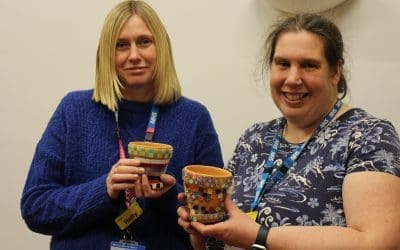This week (19-24) June is Cervical Screening Awareness Week – a campaign launched in 2021 to encourage those eligible for screening to respond to their cervical screening invitation letters and book an appointment at their GP practice or sexual health clinic if they missed their last one.
Two women die every day from cervical cancer in England, yet it is one of the most preventable cancers and getting screened can help stop it before it starts. Screening helps prevent cervical cancer by checking for a virus called high-risk HPV which causes nearly all cervical cancers. This is the best way to find out who is at higher risk of developing the cervical cell changes that over time could potentially lead to cervical cancer. Any cervical cell changes can be treated, preventing cervical cancer. Don’t be alarmed if you have HPV as it does not mean you have cervical cancer – it’s a common virus that most people will get at some point in their lives.
It has been estimated that in England, cervical screening prevents 70% of cervical cancer deaths and that if everyone attended screening regularly, 83% of cervical cancer deaths could be prevented.
Women and people with a cervix aged 25-64 are eligible for screening. Those registered as female with their GP practice are invited for routine screening every three years if they are aged 25-49, and every five years if they are aged 50-64. Those registered as male will need to request an appointment from their GP or sexual health clinic.
The Help Us Help You campaign provides information and tips for those who may be worried or embarrassed about cervical screening. These include:
- For most, cervical screening tests are not painful. But if you are worried that you may find the test uncomfortable, remember you are in control and can ask to stop at any time.
- Discuss your concerns with your nurse, you can ask for a smaller speculum or the nurse can advise you on different positions to make it more comfortable.
- If you want to make sure a woman carries out your test, you can ask for this when you make your appointment.
- You might want to wear a skirt or dress or a long jumper, which you can keep on during the test. If you forget to do this, don’t worry – you’ll be provided with a disposable modesty sheet to cover yourself.
- Ask your nurse about breathing exercises, as these can help. Take a podcast or music to listen to – this may help you relax or distract you.
- Cervical screening only lasts a few minutes, and you only have to go once every 3 or 5 years depending on your age. It’s a few minutes that could save your life.
For more information about cervical screening visit www.nhs.uk/cervicalscreening
If you missed your last cervical screening appointment, contact your GP or sexual health clinic. Gloucestershire’s sexual health service is located at Hope House, on the grounds of Gloucestershire Royal Hospital, Gloucester. For further details visit the Hope House website: Home New | Hope House Sexual Health Services




